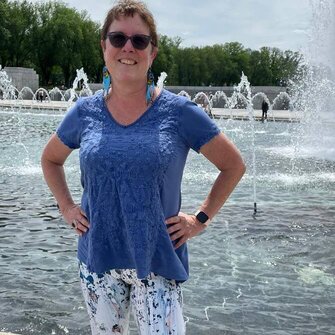
American NGO Rebuilding Alliance hires We Are Not Numbers to tell stories of its work in Gaza. Below is the latest "installment."
From practicing her speech in front of the mirror to representing Palestinian children in the hallowed halls of the U.S. Congress: That’s a long journey in many ways, especially for a teenager from the Gaza Strip. But this is one of the few “dream-come-true” stories that prove even the seemingly impossible can happen.
Lama Ramzy Abed, 14, attends UNRWA’s al-Mamounia School in Gaza City. An ambitious girl, she responded immediately when she heard there was a competition sponsored by the NGO Rebuilding Alliance to choose a young Gazan to educate American politicians on conditions in the densely populated strip. All of the UNRWA middle schools participated and Lama was chosen out of hundreds of applicants after interviewing with two of her teachers.
The teachers asked Lama in the interview, "What is peace?” That is a big question and Lama had never really thought about what living in peace would mean. But these words came to her: "Peace is holding each other’s hands so we can change things for the better and spread love."
Lama went on to be interviewed by a committee of judges, winning her spot on the delegation to the United States with her strong English and eloquent answers.
Lama learned how to speak the language so well by reading books, watching movies and listening to music. She writes in both Arabic and English and aspires to become a journalist. But after Lama heard about the competition, her dream expanded to include telling the U.S. Congress that, "Palestinians aren’t terrorists; we’re human beings. And we want peace."
To achieve that new dream, however, there were many steps to navigate. Leaving the blockaded enclave is a privilege allowed only a comparative few.
“I’m afraid my dream will be in vain and I’ll never travel,” Lama said at the time. “There are so many difficulties with Erez Crossing (between Gaza and Israel). The future always seems so uncertain to me. But I hope this opportunity will be an exceptional point in my life, and will give me the courage to achieve many dreams."
Fellow travelers

Also chosen to travel to the United States to “speak truth to power” are two other Palestinian children, from Susiya in the south Hebron hills in the West Bank—very close to the 1967 Green Line. It is one of dozens of Palestinian villages threatened by demolition and encroachment by illegal settlements. Rebuilding Alliance advocates to save Susiya as well to bring relief to Gaza.
Ayser An-Nawajja, 16, attends Wanni School in Susiya. He hopes to study political science and has visited the United States as a previous guest of Rebuilding Alliance, testifying three times to Congressional staff about the repeated attacks by Israeli settlers on his village.
The third and youngest traveler is Ahmed An-Nawajja, 12, also from Susiya. It’s his first time to visit the United States and his hope is to save his school from demolition.
A dream fulfilled

As the representatives from Gaza, Lama and her mom faced the most obstacles. First, they had to get permission from Israel to travel to Jerusalem for their U.S. visa interview. They were allowed only one day to travel there and back by bus. No stopping for sightseeing was allowed.
“I wish we had been able to visit the old city (of Jerusalem) and pray at the Dome of the Rock,” Lama’s mother, Amal, said wistfully.
Then, it took six months and three tries before they received both a permit to cross into Israel and a “nonobjection letter” from the government of Jordan allowing her to enter that country on their way to the airport in Amman. (Israel will not allow Palestinians from the West Bank and Gaza to use its Ben Gurion Airport.)
When mother and daughter finally left Gaza, they encountered still more rules, seemingly designed to discourage. For example, despite their need for sturdy luggage, no bags with wheels were allowed by the Israelis.
Lama was not discouraged. “If they told us to use a plastic bag, I would use it. I want to travel! I don’t mind relinquishing some basic rights for the sake of my dream.”
To Lama, visiting America is a chance to improve her English; she also believes her voice can make a difference, even with the American Congress. After all, she said, senators and representatives are humans too.
The entourage
Since the three travelers are so young, they are each accompanied by a parent. For Amal, it is the first time she will be away from her husband and the first time out of Gaza. Amal taught Lama to be proud of her Palestinian heritage, no matter how harsh the struggles, but also to learn from other cultures and to travel if she could. Now she can “practice what she preaches.” She sees herself as speaking for all parents whose children are suffering because U.S. President Donald Trump has cut aid for UNRWA and its schools.
"I believe someone who reaches such a high position as Congress should believe in the humanity of everyone,” she said. “It’s their job."
Heyam, Ahmed's mother, also hopes to deliver a message on behalf of all of the other parents in Susiya. She wants to tell every American who will listen that she wants to see Ahmed become a doctor, but she is afraid his school will be destroyed before he can graduate. All her family wants is the right to learn.
Lama, Ahmed, Ayser and their mothers now have the opportunity to speak to Americans for themselves.
“Rebuilding Alliance has shown me there is still humanity in this world. I hope we will find people in the U.S. Congress who are the same and will hear us," said Amal.
In part two, coming soon, Lama, Amal and their new friends from Susiya will share whether that hope was fulfilled.











